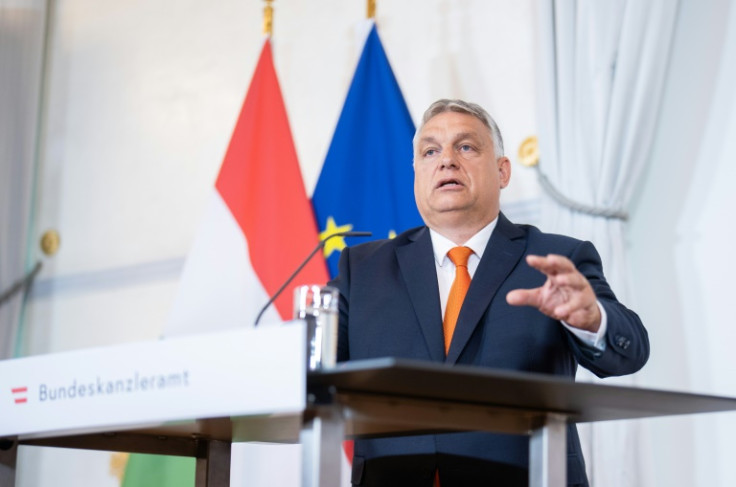As Hungary Decries EU Sanctions, Ukraine Says Without It, Russian Tanks Will Reach Budapest
KEY POINTS
- Hungary sought to allow citizens to voice their opinion on sanctions against Russia
- Prime Minister Viktor Orban exposed fissures within the E.U. over the sanctions
- Hungary's poster campaign for "national consultation" equates sanctions on Russia to bombs
Following Hungarian Prime Minister Viktor Orban's blistering attack on the E.U. over sanctions imposed on Russia, Ukrainian Foreign Ministry spokesperson Oleg Nikolenko responded Monday by saying the military assistance and sanctions are no charity, but an investment made for peace and tranquility in European cities, for which Ukrainians are paying with their own lives.
"If the EU stops sanctions pressure on Russia and military assistance to Ukraine, then Russian tanks, but we do not want it in any way, will be in Budapest faster than someone from the Hungarian government can reach Moscow," Nikolenko wrote in a Facebook post.
"Assistance to Ukraine is not charity. This is, first of all, Europe's investment in its own security. Only joint efforts can stop the Russian threat," Nikolenko continued.
Speaking on the occasion of the 66th anniversary of the Hungarian Revolution on Sunday, in the rural city of Zalaegerszeg in western Hungary, Orban sought to make a veiled comparison between the Soviet troops who attacked Hungary during the 1956 revolution and the institutions of the E.U.
"Let's not bother with those who shoot at Hungary from the shadows or from the heights of Brussels. They will end up where their predecessors did," Orban said.
Exposing fissures within the E.U. over action against Russia, Viktor Orban, the populist far-right Prime Minister of Hungary, has repeatedly decried sanctions by Brussels against Russia saying that they have "backfired" by driving up energy prices and increasing the risk of war spreading into its territory.
Meanwhile, the E.U. denounced Hungary's poster campaign for "national consultation" comparing E.U. sanctions on Russia to bombs as "inappropriate."
"It is inappropriate to show pictures of bombs or of missiles in relation to the sanctions, thinking that the aim of the sanctions is precisely to stop the bombs from falling on Ukraine," Dana Spinant, the European Commission's deputy chief spokesperson, told the press.
Hungary has sought to present its so-called "national consultation" as an effort to enable its citizens to voice their opinion in a bid to give credence to its view that public opinion in Europe is against sanctions on Russia.
The poster campaign, released by the Hungarian government, reportedly depicts a missile with "sanctions" emblazoned on it and the tagline: "Brussels sanctions, they are ripping us off."
Asserting that Hungary will be the first country in the E.U. to give citizens a chance to voice their opinion on the sanctions imposed against Russia, it asks them to fill in a questionnaire on the "Brussels oil sanctions."
The E.U. sanctions have been approved unanimously, meaning Hungary has approved each package, however, Budapest has used its veto power to carve out some exceptions, most notably on the bloc's oil embargo.
Orban, who was re-elected for a fourth consecutive term in April, faces surging inflation, plunging consumer confidence, and the prospect of a recession in 2023. He has been at odds with the E.U. with some of his policies being seen as anti-democratic and corrupt, facing the threat of funding cuts from Brussels.

© Copyright IBTimes 2024. All rights reserved.





















